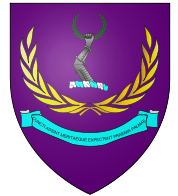University College London
| University College London | ||||||||||||
|---|---|---|---|---|---|---|---|---|---|---|---|---|
 |
||||||||||||
| Motto | Cuncti adsint meritaeque expectent praemia palmae (Latin) | |||||||||||
| Motto in English | Let all come who by merit deserve the most reward | |||||||||||
| Established | 1826 | |||||||||||
| Type | Public | |||||||||||
| Chancellor | HRH The Princess Royal (University of London) | |||||||||||
| Provost | Prof. Malcolm Grant | |||||||||||
| Admin. staff | 8,000 (4,000 academic staff) | |||||||||||
| Students | 21,620[1] | |||||||||||
| Undergraduates | 11,970[1] | |||||||||||
| Postgraduates | 9,650[1] | |||||||||||
| Location | London, United Kingdom | |||||||||||
| Colours |
|
|||||||||||
| Affiliations | Association of Commonwealth Universities European University Association League of European Research Universities University of London Russell Group Universities UK |
|||||||||||
| Website | www.ucl.ac.uk | |||||||||||
|
|
||||||||||||
University College London (UCL) is a public research university located in London, United Kingdom and the largest constituent college of the University of London.[2]
Founded in 1826, UCL was the first university institution to be founded in London, the first university institution in the United Kingdom to be established on an entirely secular basis and admit students regardless of their religion, and the first to admit women on equal terms with men.[3] UCL became one of the two founding colleges of the University of London in 1836.
UCL is one of the most highly ranked and prestigious universities in the world and forms a part of the elite 'Golden Triangle' of British universities.[4][5] It is ranked 4th in the world in the 2010 QS World University Rankings, and 3rd in Europe in the 2010 Academic Ranking of World Universities.[6][7] There are currently 21 Nobel Prize winners amongst UCL’s alumni and former staff, the most recent being Sir Charles K. Kao, who received the Nobel Prize for Physics in 2009.
UCL is a member of the Association of Commonwealth Universities, the European University Association, the League of European Research Universities, the Russell Group and Universities UK.[8]
Contents |
History
UCL was founded in 1826 under the name "London University" as a secular alternative to the religious universities of Oxford and Cambridge.[9] As such, it is often described as the "third oldest English university" (although other institutions also claim this title).
While the philosopher Jeremy Bentham is seen as the moving spirit behind the establishment of this new university for London, he personally took no part in the university's creation. Crucially, however, it was Bentham's powerful, radical ideas on education and society that had inspired the institution's founders, particularly the Scotsmen James Mill (1773–1836) and Henry Brougham (1778–1868), and shaped its creation.[10]
In 1836, "London University" became known as "University College, London" (the comma between the words College and London was commonly used until recently), when, under a Royal Charter, it worked with the recently established King's College, London, to create the federal University of London.
In 1907, the University of London was formally reconstituted with a new Royal charter, and new institutions joined the federation. Under this re-organisation it was necessary for each of the various institutions that now formed the University of London to lose their separate legal existences, and all offered degrees awarded by the University of London. This situation continued until 1977 when a new charter restored UCL's independence, although – at that time – not the power to award its own degrees.[11]
In 2005 UCL was once again granted its own taught and research Degree Awarding Powers (DAP), and all new UCL students registered from 2007–08 qualify with UCL degrees rather than degrees of the University of London. The majority of continuing students who were enrolled on taught-degree programmes before the academic year 2007–08 had the choice of whether to receive a UCL degree or a University of London degree. These changes did not apply to students registered on the MBBS programme, or federal degrees, who continued to be awarded University of London degrees. Despite these DAP changes, UCL retains its strong links with the University of London.[12]
In 2008, UCL became the first UK university to sign agreements for a campus in Australia, establishing the UCL School of Energy & Resources, Australia (SERAus) in Adelaide.[13]
Today, with over 8,000 staff and 22,000 students from over 150 countries (international students make up for a third of the student body), UCL is larger than most other universities in the United Kingdom, and is physically and academically at the centre of the University of London.
Campus

UCL is mainly based in Bloomsbury, Central London. The main campus is located around Gower Street and includes the biology, economics, engineering, geography, history, language, philosophy, politics and physics departments, the UCL Medical School, the London Centre for Nanotechnology, the UCL Union, the main UCL library, the DMS Watson Science Library, the Bloomsbury Theatre and the Petrie Museum of Egyptian Archaeology. Close by in Bloomsbury are the UCL Ear Institute, the UCL Eastman Dental Institute, the UCL Faculty of the Built Environment (The Bartlett), the UCL Faculty of Laws, the UCL Institute of Archaeology, the UCL Institute of Child Health, the UCL Institute of Cognitive Neuroscience, the UCL School of Slavonic and East European Studies and University College Hospital.[14] Elsewhere in Central London are the UCL Institute of Ophthalmology (based in Clerkenwell), the Windeyer Institute (based in Fitzrovia) and the UCL Institute of Orthopedics and Musculoskeletal Science (based in Stanmore). The Department of Space and Climate Physics (Mullard Space Science Laboratory) is based in Holmbury St Mary, Surrey.
A number of important institutions are based near to the main campus, including the British Library, the British Medical Association, the British Museum, Cancer Research UK, the Institute for Fiscal Studies, the Medical Research Council, RADA, the Royal Academy of Art and the Wellcome Trust. Many University of London schools and institutes are also close by, including Birkbeck, University of London, the Institute of Education, London Business School, London School of Hygiene & Tropical Medicine, the Royal Veterinary College, the School of Advanced Study, SOAS, and the Senate House Library. The nearest London Underground station is Euston Square, with Goodge Street, Russell Square and Warren Street all nearby. The mainline railway stations at Euston, King's Cross and St Pancras are all within walking distance.
UCL has a campus in Adelaide, Australia to provide specialist energy and resources-focused education. [15]
Notable buildings
Notable UCL buildings include:
- The UCL Main Building, including the Octagon, Quad, Cloisters and the Wilkins building designed by Architect William Wilkins
- Alexandra House (17 Queen Square), home to the UCL Institute of Cognitive Neuroscience and Gatsby Computational Neuroscience Unit
- Bedford Way Buildings, home to the Psychology, Geography and the Language Centre
- Bentham House (Endsleigh Street), home to the UCL Faculty of Laws
- Christopher Ingold Laboratory (Gordon Street), home to the Chemistry department
- Cruciform Building — a red-brick building notable for being built in a cross shape, home to the UCL Medical School
- DMS Watson Science Library, named after D. M. S. Watson, a former professor of zoology
- Engineering Building (Malet Place) renamed to Roberts building in 2005
- London Centre for Nanotechnology (Gordon Street)
- Malet Place Engineering Building, home to the Computer Science and Medical Physics departments
- Medawar (named after Peter Medawar)
- Pearson Building (Quad), home to the Geography department
- Rockefeller Building (Science)
- UCL School of Slavonic and East European Studies building
- University College Hospital
- UCL Union building (Gordon Street)
- The Bloomsbury Theatre (Gordon Street)
- The Rubin Building (Tavistock Square), home to the Department of Political Science and The Constitution Unit
Of UCL's notable buildings listed above, the most recent additions include: the Engineering Wing on Malet Place and the Andrew Huxley Building within the Gower Street site;[16] the London Centre for Nanotechnology on Gordon Street; the School of Slavonic and East European Studies building (formerly at Senate House) which was opened by Princess Anne and Václav Klaus, the President of the Czech Republic, in October 2005 on Taviton Street; [17] and the new wing of The Institute of Ophthalmology, opened in 2005.[18]
 The UCL Main Building is the centre of the UCL campus |
 The College Cloisters inside the UCL Main Building |
 The UCL Quad, part of the main campus, in front of the UCL Main Building |
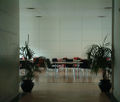 The Jeremy Bentham common room inside the UCL Main Building |
 A night-time view of the UCL Main Building's portico |
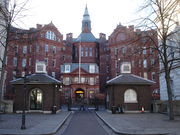 UCL Entrance on Gower Street and the Cruciform Building opposite |
 UCL Bedford Way – The building houses the psychology department and some of the geography department. It adjoins the Institute of Education |
 An example of student accommodation – UCL's Newest Hall of Residence — Frances Gardner House in Clerkenwell |
 The Flaxman Gallery, a collection of sculptures and paintings by artist John Flaxman is located inside the 'main library' in the Octagon building under UCL's central dome |
 Ramsay Hall of Residence, Maple Street, London |
 Jeremy Bentham overseeing the construction of UCL in the Flaxman gallery inside the 'main library' |
 UCL Institute of Archaeology, on Gordon Square |
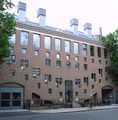 UCL School of Slavonic and East European Studies, on Taviton street |
 The new building and tower of University College Hospital, seen from Euston Road |
 Schafer House a hall of residence of University College London. It accommodates 369 students. It was opened in 1995. |
Organisation and administration
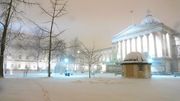
Although UCL voluntarily remains a constituent college of the University of London, it is in most ways comparable with free-standing, self-governing and independently funded universities, and it awards its own degrees.[19]
The current Provost and President of UCL is Professor Malcolm Grant.[20]
Faculties and departments
UCL’s research and teaching is organised within a network of faculties and academic departments. Faculties and academic departments are formally established by the UCL Council, the governing body of UCL, on the advice of the Academic Board, which is UCL’s senior academic authority.
UCL currently has the following eight faculties:
- UCL Faculty of Arts and Humanities
- UCL Faculty of Biomedical Sciences
- UCL Faculty of the Built Environment (The Bartlett)
- UCL Faculty of Engineering Sciences
- UCL Faculty of Laws
- UCL Faculty of Life Sciences (Biological and Medical)
- UCL Faculty of Mathematical and Physical Sciences
- UCL Faculty of Social and Historical Sciences
The UCL School of Slavonic and East European Studies exists as an academic unit outside of the faculty structure.
In order to facilitate greater interdisciplinary interaction in research and teaching, UCL has also established three strategic faculty groupings:
- UCL School of Life and Medical Sciences (comprising the UCL Faculties of Biomedical and Life Sciences and incorporating the UCL Medical School)
- UCL Faculty of the Built Environment, UCL Faculty of Engineering Sciences and UCL Faculty of Mathematical & Physical Sciences
- UCL Faculty of Arts & Humanities, UCL Faculty of Laws, UCL Faculty of Social & Historical Sciences and the UCL School of Slavonic & East European Studies.
Finances
In 2008/09 UCL had a net income of £713.7 million (2007/08 - £635.4 million) and total expenditure of £701.8 million (2007/08 - £634.7 million). Key sources of income included £248.6 million from research grants and contracts, £209.8 million from Funding Council grants, and £8.1 million from endowment and investment income.[21]
At year end UCL had endowments of £57.1 million and reserves of £182.6 million. Total net assets were £598 million.
Logo and arms
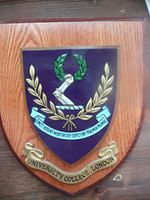
Whereas most universities primarily use their logo on mundane documents but their coat of arms on official documents such as degree certificates, UCL exclusively uses its logo.[22] UCL does have a coat of arms however, which depicts a raised bent arm dressed in armour holding a green upturned open wreath.[23]
The blazon of these arms is:
Purpure, on a wreath of the colours Argent and Blue Celeste, an arm in armour embowed Argent holding an upturned wreath of laurel Vert, beneath which two branches of laurel Or crossed at the nombril and bound with a bowed cord Or, beneath the nombril a motto of Blue Celeste upon which Cuncti adsint meritaeque expectant praemia palmae
UCL's traditional sporting and academic colours of purple and light blue are derived from the arms.
G5 lobby
Within the United Kingdom UCL has been identified as part of a group of universities which has started to act as a self-conscious lobby and pressure group, commonly known as the G5.[24][25] According to Times Higher Education, the five institutions are Imperial College London, the LSE, the University of Cambridge, the University of Oxford, and UCL, and it describes them as the super-elite (since all five are already members of the elite Russell Group).[24]
Academics
UCL offers more than 200 degrees in traditional fields of study, with virtually all subjects rated internationally-excellent or world-leading.[26] Many students get to learn abroad; UCL has partnerships with 46 of the world’s top 100 universities.[26] UCL has hundreds of collaborative research and teaching partners, including almost 150 research links and 129 student-exchange partnerships with top European and North-American universities.[3]
Faculty and staff
As at October 2009, UCL had 4,078 academic and research staff across its eight faculties:[27]
- UCL Faculty of Arts & Humanities - 180
- UCL Faculty of Biomedical Sciences - 1,971
- UCL Faculty of Built Environment - 136
- UCL Faculty of Engineering Sciences - 391
- UCL Faculty of Laws - 62
- UCL Faculty of Life Sciences - 591
- UCL Faculty of Mathematical & Physical Sciences - 445
- UCL Faculty of Social & Historical Sciences - 292
UCL has the highest number of professors of any university in the UK. There are currently 36 Fellows of the Royal Society, 26 Fellows of the British Academy, 10 Fellows of the Royal Academy of Engineering and 78 Fellows of the Academy of Medical Sciences amongst UCL academic and research staff.[27]
Research
According to data released in July 2008 by the Thomson ISI Web of Knowledge’s Essential Science Indicators, UCL is the 13th most-cited institution in the world (and most-cited in the UK). The analysis covers citations from 1 January 1998 to 30 April 2008, during which 46,166 UCL research papers attracted 803,566 citations. The number of citations generated by academic publications is an important indication of institutional importance and influence. The report covers citations in 21 subject areas and the results revealed some of UCL's key strengths:
- in Clinical Medicine – 1st outside North America
- in Neuroscience & Behaviour – 1st outside North America and 2nd in the world
- in Psychiatry/Psychology – 2nd outside North America
- in Immunology – 2nd in Europe
- in Pharmacology & Toxicology – 1st outside North America and 4th in the world
- in Social Sciences, General – 1st outside North America[28]
UCL has placed cross-disciplinary research as a priority and is orientating its research around four "Grand Challenges". Professor David Price, Pro-Provost for Research explains: "We believe we have a moral obligation to make a difference to global problems, and to combine the knowledge that our research generates to develop wisdom that can be applied in each of the four Grand Challenges: Global Health, Sustainable Cities, Intercultural Interaction and Human Wellbeing."[29]
In the Times Higher Education ranking of research council awards 2008-9 UCL is shown to have won the most research awards with 174 awards amounting to £81,365,000. In second place Cambridge won 162 awards amounting to £74,263,000. In third place Oxford won 153 awards amounting to £54,750,000. This is thought to be the first time that a university other than Cambridge or Oxford has headed the table.
UCL has also been very successful in securing research funding under the Engineering and Physical Sciences Research Council's (EPSRC) prestigious centres for doctoral training (CDTs). The aim of these centres is to "provide a supportive and exciting environment for students to carry out a challenging PhD-level research project together with taught coursework".[30] UCL has won funding for 9 of these centres, the next highest allocation was 4 centres awarded to the University of Bath. The centres awarded to UCL are worth £40 million, which will fund 390 PhD places.
UCL's 9 CDTs are Energy Demand Reduction and the Built Environment (UCL Energy Institute and Loughborough University), Financial Computing (UCL Computer Science), Security Science (UCL Centre for Crime and Security Science), Photonic Systems Development (UCL Electronic and Electrical Engineering in partnership with Cambridge University), Virtual Environments, Imaging and Visualisation (UCL Computer Science and UCL Bartlett School), Molecular Modelling and Materials Science (UCL Chemistry), Urban Sustainability & Resilience (UCL Civil, Environmental and Geomatic Engineering and UCL Bartlett School), Bioprocess Engineering Leadership (UCL Biochemical Engineering) and CoMPLEX (UCL Life Sciences).
There are currently approximately 3,000 PhD students working at UCL. The University provides information for prospective PhD students on its Graduate web pages.
Medicine
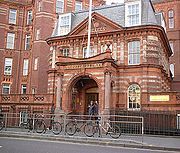
UCL has offered courses in medicine since 1834 but the current medical school has developed from successive mergers with the medical schools of the Middlesex Hospital (founded 1746) and the Royal Free Hospital (founded as the London School of Medicine for Women in 1874).[31]
Clinical medicine is primarily taught at three hospitals in London: University College Hospital, The Royal Free Hospital and the Whittington Hospital. University College Hospital is one of central London's largest NHS hospitals and is part-financed by the university.[32] UCL’s 11 associated teaching hospitals include the Great Ormond Street Hospital for Children, the National Hospital for Neurology and Neurosurgery and Moorfields Eye Hospital. UCL is a founding member of the UCL Partners academic health science centre, the largest biomedical research organisation in Europe with a turnover of approximately £2 billion.[33]
In 2007 UCL joined with the Medical Research Council, Cancer Research UK and the Wellcome Trust to establish the UK Centre for Medical Research and Innovation (UKCMRI). This £600 million centre will be set on a site in London between the British Library and St Pancras Eurostar terminal, and will be one of the world’s largest medical research centres, housing 1,500 scientists and support staff working on a range of biomedical projects.[34] [35]
Admissions
Admission to UCL is highly selective. Many of UCL's courses require 3 A grades at A Level, or a grade equivalent of 6,6,6 on higher level subjects on the International Baccalaureate Program.
Due to a very high proportion of applicants receiving the highest school grades, UCL,[36] along with Imperial College London and the University of Cambridge[37] is one of the first universities in the UK to make use of the A* grade at A-Level (to be introduced in 2010) for admissions, particularly for very oversubscribed courses such as Economics, Mathematics, History, Psychology, and European Social and Political Studies.
Rankings
In the 2010 QS World University Rankings, UCL is ranked 4th overall in the world (and 2nd in Europe),[6] 12th in the world for arts and humanities (and 3rd in Europe),[38] 15th in the world for life sciences and medicine (and 4th in Europe),[39] and 25th in the world for social sciences (and 5th in Europe).[40] In the 2010 Academic Ranking of World Universities, UCL is ranked 21st overall in the world (and 3rd in Europe),[41] 11th in the world (and 2nd in Europe) for clinical medicine & pharmacy,[42] and 20th in the world (and 4th in Europe) for life & agricultural sciences.[43]
UCL is consistently one of the top multi-faculty universities in UK university rankings. UCL is ranked first in the UK for its staff/student ratio in The Times Good University Guide, The Sunday Times University Guide and The Guardian University Guide.[3] UCL law school is "tipped by insiders as the best law faculty in the United Kingdom"[44] and UCL's economics department rivals the LSE's in terms of competitiveness and entry requirements. The Slade School of Fine Art, UCL's art department, is internationally renowned for its excellence,[45] and UCL's Bartlett School of Architecture and Institute of Archaeology are widely considered the best in their respective fields in the UK.
| 2010 | 2009 | 2008 | 2007 | 2006 | 2005 | |
|---|---|---|---|---|---|---|
| QS World University Rankings | 4 th[6] | 4 th[46] | 7 th[47] | 9 th[48] | 25th[49] | 28th[50] |
| Academic Ranking of World Universities | 21st[51] | 21st[52] | 22nd[53] | 25th[54] | 26th[55] | 26th[56] |
| 2011 | 2010 | 2009 | 2008 | 2007 | 2006 | 2005 | |
|---|---|---|---|---|---|---|---|
| Times Good University Guide | 7th | 5th[57] | 7th[57] | 6th[58] | 5th[59] | 6th | 6th[60] |
| Guardian University Guide | 5th | 6th[61] | 7th[62] | 5th[62] | 4th | 4th[63] | 7th[64] |
| Sunday Times University Guide | 4th | 4th[65] | 4th | 6th[66] | 5th[66] | 5th[67] | 5th[68] |
| The Complete University Guide | 9th[69] | 8th[70] | 8th[71] | 6th | |||
| The Daily Telegraph | 6th[72] |
Libraries
The UCL library is divided across several sites within the UCL campus and across Bloomsbury.[73] All in all, there are over 16 different libraries. Access to each library is gained by the use of an electronic swipe card through electronic security barriers. The libraries are linked together by a networking catalogue and request system called eUCLid.[74] The largest collection of material is held in the Main Library, which is in the UCL Main Building. It contains UCL's collections relating to arts and humanities, history, economics, public policy and law.[75] The Flaxman Gallery, a collection of sculptures and paintings by artist John Flaxman, is located inside the library in the Octagon building under UCL's central dome.
The second largest library – the UCL Science Library – occupies the DMS Watson building on Malet Place. It contains UCL's books and journals related to engineering, mathematics, anthropology, geography, and science. It is adjacent to the Petrie Museum of Egyptian Archaeology, access to which is next to the library entrance. Other libraries within UCL include the Cruciform Library (medical science), the Environmental Studies Library (architecture and planning) and the School of Slavonic and East European Studies library on Taviton Street.[76][77][78]
Since 2004, UCL Library Services has been collecting the scholarly work of its researchers to make it freely available over the web via an open access repository known as UCL Eprints.[79] The intention is that material curated by UCL Eprints will remain accessible indefinitely.[80]
All UCL students on degree courses, and all UCL staff, also have full access to the Senate House Library, which houses the University of London's world-class research collections. The Senate House Library focuses on the arts, humanities and social sciences.
Museums and collections
UCL's Special Collections contains UCL's collection of historical or culturally significant works. It is one of the foremost university collections of manuscripts, archives and rare books in the UK.[81] It includes collections of medieval manuscripts and early printed books, as well as significant holdings of 18th-century works, and highly important 19th- and 20th-century collections of personal papers, archival material, and literature, covering a vast range of subject areas. Archives include the Latin American archives, the Jewish collections and the George Orwell Archive.[82] Collections are often displayed in a series of glass cabinets in the Cloisters of the UCL Main Building.[83]
The most significant works are housed in the Strong Rooms. The special collection includes first editions of Isaac Newton's Principia, Charles Darwin's On the Origin of Species and James Joyce's Ulysses . The earliest book in the collection is The crafte to lyve well and to dye well, printed in 1505.[84]

UCL is responsible for several museums[85] and collections in a wide range of fields across the arts and sciences:
- Petrie Museum of Egyptian Archaeology: one of the leading collections of Egyptian and Sudanese archaeology in the world. Open to the public on a regular basis.[86]
- Grant Museum of Zoology And Comparative Anatomy: a diverse Natural History collection covering the whole of the animal kingdom. Includes rare dodo and quagga skeletons. A teaching and research collection, it is named after Robert Edmund Grant, UCL's first professor of comparative anatomy and zoology from 1828, now mainly noted for having tutored the undergraduate Charles Robert Darwin at the University of Edinburgh in the 1826–1827 session. Open at limited fixed times and by appointment.[87]
- Geology Collections: founded around 1855. Primarily a teaching resource and may be visited by appointment.[88]
- Art Collections: these date from 1847 when a collection of sculpture models and drawings of the Neo-classical artist John Flaxman was presented to UCL. There are over 10,000 pieces dating from the 15th century onwards including drawings by Turner, etchings by Rembrandt, and works by many leading 20th century British artists. The works on paper are displayed in the Strang Print Room, which has limited regular opening times. The other works may be viewed by appointment.[89]
- Institute of Archaeology Collections: Items include prehistoric ceramics and stone artefacts from many parts of the world, the Petrie collection of Palestinian artefacts, and Classical Greek and Roman ceramics. Visits by appointment only.[90]
- Ethnography Collections: This collection exemplifying Material Culture, holds an enormous variety of objects, textiles and artefacts from all over the world. Visits by appointment only.[91]
- Galton Collection: The scientific instruments, papers and personal memorabilia of Sir Francis Galton. Housed in the department of biology. Visits by appointment only.[92]
- Science Collections: Diverse collections primarily accumulated in the course of UCL's own work, including the operating table on which the first anaesthetic was administered. Items may be a viewed by appointment.[93]
Student life
UCL Union

The UCL Union, founded in 1893, has a credible claim to be England's oldest students' union.[11] Today UCL Union exists both as the representative voice for UCL students, and as a provider of a wide range of services. It is democratically controlled through General Meetings and referenda, and is run by elected student officers. The Union has provided a prominent platform for political campaigning of all kinds in recent years. It also supports a range of services, including numerous clubs and societies, sports facilities, and an advice service, as well as a number of bars, cafes and shops.[94]
Some examples of Clubs and Societies provided by the UCL Union:
- UCL Union Fencing Club
- University College London Boat Club (both Men's and Women's clubs)
- Pi Media (responsible for Pi Magazine and Pi Newspaper, UCL's official student publications)
- UCL Cross Country and Athletics Club
- University College London Dramatic Society
- UCL Yoga and Meditation Society
- UCL Karting Society
- UCL Friends of Palestine Society
- UCL Krishna Consciousness Society
- UCL Football Club (consisting of 7 teams)
- UCL Rugby Club (both Men's and Women's as well as Medical School clubs)
- The Cheese Grater Magazine
- UCL Stop the War Society
Notable Union-supported campaigns include:
- UCLU Free Education Campaign - campaigning for the return of free and non-marketised higher education.
- The London Living wage Campaign - campaigning for a basic minimum for all UCL staff.
- Disarm UCL - a group which successfully persuaded UCL to divest from arms manufacturers.
- Save UCL - a group campaigning against education cuts. The name was also used by a group that opposed the Imperial Merger in 2006.
Student housing
Many UCL students are accommodated in the college's own halls of residence or other accommodation, including:
- Arthur Tattersall House (115–131 Gower Street)
- Astor College (99 Charlotte St)
- Campbell House East and West (Taviton Street)
- Ifor Evans & Max Rayne Student Residences (109 Camden Road)
- Frances Gardner House and Langton Close (Gray's Inn Road)
- John Tovell House (89 & 93–7 Gower Street)
- John Dodgson House (Bidborough Street)
- Ramsay Hall and Ian Baker House Student Residences(Maple Street)
- Schafer House Student Residence (Drummond Street)
- James Lighthill House (Pentonville Road)
- Goldsmid House (Gillingham Street) relocated in 2008 from Oxford Street
Most students in college or university accommodation are first-year undergraduates. The majority of second and third-year students and postgraduates find their own accommodation in the private sector. This is partly due to the fact that accommodation in and around Central London is often cheaper than university accommodation when shared with friends or flat-mates.
There is also limited UCL accommodation available for married students and those with children at Bernard Johnson House, Hawkridge, Neil Sharp House and the University of London's Lilian Penson Hall.[95]
Intercollegiate halls of residence UCL students are also eligible to apply for places in the University of London intercollegiate halls of residence.[96] The halls are:
- Canterbury Hall, Commonwealth Hall, College Hall, Connaught Hall, Hughes Parry Hall and International Hall near Russell Square in Bloomsbury
- Lillian Penson Hall (postgraduates only) in Paddington
- Nutford House in Marble Arch
Some students are also selected to live in International Students House, London.
Rivalry with King's College London
- Main Article Student Rags
UCL has a long-running, mostly friendly, rivalry with King's College London (King's), which has historically been known as "Rags".[97] UCL is often referred to by students from King's as the "Godless Scum of Gower Street", in reference to a comment made at the founding of King's, which was based on Christian principles. UCL students refer to King's as "Strand Polytechnic" in a similar attitude.
King's' mascot, Reggie the Lion, went missing in the 1990s and was recovered after being found dumped in a field. It was restored at the cost of around £15,000 and then placed on display in the students' union.[98] It is in a glass case and filled with concrete to prevent theft, particularly by UCL students who once castrated it. In turn, King's' students are also believed to have once stolen Phineas, a UCL mascot.[99] It is often claimed that King's' students played football with the embalmed head of Jeremy Bentham. Although the head was indeed stolen, the football story is a myth which is unsupported by official UCL documentation about Bentham available next to his display case (his Auto Icon) in the UCL cloisters. The head is now kept in the UCL vaults.[100]
Notable alumni, faculty and staff

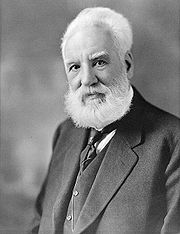
21 Nobel prizes have been awarded to UCL academics and students (ten of which were in Physiology & Medicine) as well as three Fields Medals.[101][102]
Notable alumni
UCL alumni include the 'father of the nation' of both India and Kenya, the inventor of the telephone, the co-discoverer of the structure of DNA, and all of the members of the band Coldplay.
Politicians include Mohandas Karamchand Gandhi (મોહનદાસ કરમચંદ) (leader of the independence movement and 'father of the nation'), Jomo Kenyatta (first Prime Minister (1963–1964) and President (1964–1978) of Kenya and 'father of the nation'), Chaim Herzog (חיים הרצוג) (President of Israel (1983–1993)), Itō Hirobumi (伊藤 博文), first Prime Minister of Japan (1885–1888), Junichiro Koizumi (小泉 純一郎) (Prime Minister of Japan (2001-2006)), Wu Tingfang (伍廷芳), also Ng Choy (伍才) (Acting Premier during the early years of the Republic of China) and Sir Stafford Cripps (British Chancellor of the Exchequer (1947-1950)).
Scientists and engineers include Alexander Graham Bell (inventor of the telephone), Colin Chapman (founder of Lotus Cars), Francis Crick (co-discoverer of the structure of DNA), John Ambrose Fleming (inventor of the vacuum tube), Jaroslav Heyrovský (father of the electroanalytical method), Sir Charles Kuen Kao (winner of the 2009 Nobel Prize in Physics) and Joseph Lister (pioneer of antiseptic surgery).
Authors include Raymond Briggs, Robert Browning, G. K. Chesterton, David Crystal, Stella Gibbons, Marie Stopes and Rabindranath Tagore.
Artists include Sir William Coldstream (realist painter), Antony Gormley (sculptor), Augustus John (painter, draughtsman and etcher), Ben Nicholson (abstract painter) and Sir Eduardo Paolozzi (sculptor and artist).
Lawyers include a Lord Chancellor (Lord Herschell), the former Chief Justices of England (Lord Woolf), Hong Kong (Sir Yang Ti-liang), India (A. S. Anand) and Ghana (Samuel Azu Crabbe), two Masters of the Rolls (Lord Cozens-Hardy; Sir George Jessel), as well as the Attorneys-General of England (Lord Goldsmith; Baroness Scotland), Singapore (Tan Boon Teik; Chao Hick Tin) and Gambia (Hassan Bubacar Jallow).
Business people include Lord Digby Jones (Director-General of the Confederation of British Industry (2001-2006)) and Edwin Waterhouse (founding partner of PricewaterhouseCoopers).
Journalists and commentators include A. A. Gill (columnist), three former editors of The Economist, most notably Walter Bagehot, two editors of The Times Literary Supplement, and Jonathan Dimbleby (television and radio current affairs presenter).
Entertainers, musicians and composers include Ricky Gervais (comedian and actor), Gustav Holst (composer), Chris Martin and all three other members of the band Coldplay, Christopher Nolan (director of films including The Dark Knight), Tim Rice-Oxley and Richard Hughes of the band Keane and Jonathan Ross (television presenter).
Sports people include David Gower (former captain of the England cricket team), Patrick Head (co-founder of the Williams Formula One team) and Christine Ohuruogu (Olympic 400 metres gold medalist).
Notable faculty and staff
Notable former UCL faculty and staff include Jocelyn Bell Burnell (co-discoverer of radio pulsars), Ronald Dworkin (philosopher of law and scholar of constitutional law), Lucian Freud (painter), Francis Galton (founder of psychometrics and father of fingerprinting), Sir Frank Kermode (literary critic), Tomáš Garrigue Masaryk (first President of Czechoslovakia and 'father of the nation') and John Stuart Mill (philosopher).
All five of the naturally occurring noble gases were discovered at UCL by Sir William Ramsay, who was a professor of chemistry and after whom Ramsay Hall is named.[103]
UCL in fiction
Due to its position within London and the historical nature of its buildings, including most notably the UCL Main Building and quad, UCL has been used as a location for a number of film and television productions, including Gladiator (2000), The Dark Knight (2008) and Inception (2010).[104]
See also
- Education in London
- Third oldest university in England debate
References
- ↑ 1.0 1.1 1.2 "Table 0a – All students by institution, mode of study, level of study, gender and domicile 2005/06". Higher Education Statistics Agency online statistics. http://www.hesa.ac.uk/holisdocs/pubinfo/student/institution0506.htm. Retrieved 2007-03-31.
- ↑ "Profile: University College London". Times Online. 1 June 2009. http://www.timesonline.co.uk/tol/life_and_style/education/good_university_guide/article2166791.ece. Retrieved 2 September 2010.
- ↑ 3.0 3.1 3.2 "UCL | Fulbright University Partners | US-UK Fulbright Commission". Fulbright.co.uk. http://www.fulbright.co.uk/fulbright-awards/for-us-citizens/postgraduate-student-awards/university-partners/ucl. Retrieved 2010-04-26.
- ↑ "'Golden triangle' to win funding riches". Times Higher Education. 11 February 2010. http://www.timeshighereducation.co.uk/story.asp?storycode=410357. Retrieved 2 September 2010.
- ↑ "London is capital of world's educational elite". London Evening Standard. 8 October 2009. http://www.thisislondon.co.uk/standard/article-23753967-ucl-overtakes-oxford-in-the-world-rankings.do. Retrieved 2 September 2010.
- ↑ 6.0 6.1 6.2 "University College London". QS Quacquarelli Symonds Limited. http://www.topuniversities.com/university/366/universitycollegelondonucl. Retrieved 8 September 2010.
- ↑ "Top 100". Academic Ranking of World Universities - 2010. http://www.arwu.org/ARWU2010.jsp. Retrieved 14 August 2010.
- ↑ http://www.ucl.ac.uk/images/Uni-Lon.pdf
- ↑ "History of UCL". Ucl.ac.uk. http://www.ucl.ac.uk/about-ucl/history. Retrieved 2010-04-26.
- ↑ "UCL Bentham Project". Ucl.ac.uk. 2009-04-02. http://www.ucl.ac.uk/Bentham-Project/info/jb.htm. Retrieved 2010-04-26.
- ↑ 11.0 11.1 "Landmarks". Ucl.ac.uk. http://www.ucl.ac.uk/about-ucl/history/landmarks. Retrieved 2010-04-26.
- ↑ 'UCL Unveils New Academic Dress' in UCL News. URL: < http://www.ucl.ac.uk/news/news-articles/0803/08032602 >, was live on 25 July 2008
- ↑ "UCL School of Energy & Resources, Australia, to be established'". UCL News. 29 May 2008. http://www.ucl.ac.uk/news/news-articles/0805/08052901. Retrieved 2008-08-01.
- ↑ "Campus location maps, University College London". Ucl.ac.uk. http://www.ucl.ac.uk/about-ucl/location/maps. Retrieved 2010-04-26.
- ↑ "University College London, Adelaide, Australia". Ucl.ac.uk. http://www.ucl.ac.uk/australia/. Retrieved 2010-06-14.
- ↑ "Faculty of Engineering Sciences". Ucl.ac.uk. http://www.ucl.ac.uk/news/right-column/ucl-views/engineering. Retrieved 2010-04-26.
- ↑ http://www.ucl.ac.uk/alumni/pdfs/news.pdf
- ↑ "Institute of Ophthalmology". Ucl.ac.uk. http://www.ucl.ac.uk/ioo/research/cordeira.htm. Retrieved 2010-04-26.
- ↑ Degree Awarding, University College London
- ↑ "UCL Provost and President". Ucl.ac.uk. http://www.ucl.ac.uk/provost/. Retrieved 2010-04-26.
- ↑ "Annual Report and Financial Statements for the year ended 31 July 2009". UCL. http://www.ucl.ac.uk/finance/report_account_arch/report_accounts2008-09.pdf. Retrieved 13 August 2010.
- ↑ "Crest – The Student Room". Thestudentroom.co.uk. http://www.thestudentroom.co.uk/showthread.php?t=506124. Retrieved 2010-04-26.
- ↑ "logobig on Flickr – Photo Sharing!". Flickr.com. 2007-07-30. http://www.flickr.com/photos/guyfwoodward/950670333/. Retrieved 2010-04-26.
- ↑ 24.0 24.1 "Times Higher Education – Education news, resources and university jobs for the academic world". Timeshighereducation.co.uk. 2004-02-06. http://www.timeshighereducation.co.uk/story.asp?storyCode=186508§ioncode=26. Retrieved 2010-04-26.
- ↑ http://www.lse.ac.uk/collections/pressAndInformationOffice.bak/staffStudentsAndAlumni/dailyHeadlines/06-02-04.htm
- ↑ 26.0 26.1 Profile: University College London – Times Online
- ↑ 27.0 27.1 "Facts and Figures". UCL. http://www.ucl.ac.uk/about-ucl/facts. Retrieved 27 August 2010.
- ↑ "Research powerhouse: UCL top-cited in UK". Ucl.ac.uk. http://www.ucl.ac.uk/news/news-articles/0807/08071504. Retrieved 2010-04-26.
- ↑ "UCL tops the THE league table in research grant wins". Ucl.ac.uk. 2009-09-03. http://www.ucl.ac.uk/silva/news/news-articles/0909/09090301. Retrieved 2010-04-26.
- ↑ New centres for doctoral training listed by university
- ↑ "UCL Medical School". Ucl.ac.uk. 2010-02-17. http://www.ucl.ac.uk/medicalschool/about-medicalschool. Retrieved 2010-04-26.
- ↑ "UCLH Internet – University College London Hospital". Uclh.nhs.uk. http://www.uclh.nhs.uk/. Retrieved 2010-04-26.
- ↑ "NHS hospitals to forge £2bn research link-up with university". The Guardian (London). 2008-08-07. http://www.guardian.co.uk/society/2008/aug/07/health.highereducation. Retrieved 2010-08-11.
- ↑ 'UCL in partnership for world-class medical research centre: St Pancras land sale' in UCL News, 5 December 2007: <http://www.ucl.ac.uk/news/news-articles/0712/07120501>. Retrieved 24 January 2009.
- ↑ "Sir Paul's vision". The Economist (London). http://www.economist.com/node/21008577. Retrieved 2010-08-11.
- ↑ "Mathematics: Undergraduate Prospectus 2010: Prospective Students". UCL. 2010-03-15. http://www.ucl.ac.uk/prosp-students/prospectus/maps/mathematics/. Retrieved 2010-04-26.
- ↑ "UK | Education | Cambridge entry level is now A*AA". BBC News. 2009-03-16. http://news.bbc.co.uk/1/hi/education/7946675.stm. Retrieved 2010-04-26.
- ↑ "Arts and Humanities". QS Quacquarelli Symonds Limited. http://www.topuniversities.com/university-rankings/world-university-rankings/2010/subject-rankings/arts-humanities. Retrieved 8 September 2010.
- ↑ "Life Sciences and Medicine". QS Quacquarelli Symonds Limited. http://www.topuniversities.com/university-rankings/world-university-rankings/2010/subject-rankings/life-science-biomedicine. Retrieved 8 September 2010.
- ↑ "Social Sciences". QS Quacquarelli Symonds Limited. http://www.topuniversities.com/university-rankings/world-university-rankings/2010/subject-rankings/social-science. Retrieved 8 September 2010.
- ↑ "Top 100". Academic Ranking of World Universities - 2010. http://www.arwu.org/ARWU2010.jsp. Retrieved 14 August 2010.
- ↑ "Clinical Medicine and Pharmacy". Academic Ranking of World Universities - 2010. http://www.arwu.org/FieldMED2010.jsp. Retrieved 14 August 2010.
- ↑ "Life and Agriculture Sciences". Academic Ranking of World Universities - 2010. http://www.arwu.org/FieldLIFE2010.jsp. Retrieved 14 August 2010.
- ↑ [1] in http://www.timesonline.co.uk/tol/life_and_style/education/good_university_guide/article526344.ece
- ↑ Double first for Oxford – Times Online
- ↑ "THES – QS World University Rankings". http://www.timeshighereducation.co.uk/Rankings2009-Top200.html. Retrieved 2009-10-08.
- ↑ "THES – QS World University Rankings". http://www.topuniversities.com/worlduniversityrankings/results/2008/overall_rankings/top_100_universities/. Retrieved 2008-10-09.
- ↑ "THES – QS World University Rankings". http://www.topuniversities.com/worlduniversityrankings/results/2007/overall_rankings/top_100_universities/. Retrieved 2007-12-24.
- ↑ "THES – QS World University Rankings 2006". THES. http://www.topuniversities.com/worlduniversityrankings/results/2006/overall_top_200_full_details/. Retrieved 2007-11-03.
- ↑ "THES – QS World University Rankings 2005". THES. http://www.topuniversities.com/worlduniversityrankings/results/2005/top_200_universities/. Retrieved 2007-11-03.
- ↑ "Top 100". Academic Ranking of World Universities - 2010. http://www.arwu.org/ARWU2010.jsp. Retrieved 14 August 2010.
- ↑ Academic Ranking of World Universities by Shanghai Jiao Tong University 2009
- ↑ Academic Ranking of World Universities by Shanghai Jiao Tong University 2008
- ↑ "Academic Ranking of World Universities by Shanghai Jiao Tong University 2007". Ed.sjtu.edu.cn. http://ed.sjtu.edu.cn/rank/2007/ARWU2007FullListByRank.pdf. Retrieved 2010-04-26.
- ↑ "Academic Ranking of World Universities by Shanghai Jiao Tong University 2006". Ed.sjtu.edu.cn. http://ed.sjtu.edu.cn/rank/2006/ARWU2006FULLLIST-BY%20RANK%20(PDF).pdf. Retrieved 2010-04-26.
- ↑ "Academic Ranking of World Universities by Shanghai Jiao Tong University 2005". Ed.sjtu.edu.cn. http://ed.sjtu.edu.cn/rank/2005/ARWU2005FullList2.pdf. Retrieved 2010-04-26.
- ↑ 57.0 57.1 "University Rankings League Table 2010 | Good University Guide – Times Online". London: Extras.timesonline.co.uk. http://extras.timesonline.co.uk/tol_gug/gooduniversityguide.php. Retrieved 2010-04-26.
- ↑ "The Times Good University Guide 2008". The Times (London). http://extras.timesonline.co.uk/gug/gooduniversityguide.php. Retrieved 2007-11-03.
- ↑ "The Times Good University Guide 2007 – Top Universities 2007 League Table". The Times (London). http://www.timesonline.co.uk/displayPopup/0,,102571,00.html. Retrieved 2007-11-03.
- ↑ "The Times Top Universities". The Times (London). http://www.timesonline.co.uk/displayPopup/0,,32607,00.html. Retrieved 2007-11-03.
- ↑ "University guide 2010: University league table | Education". London: guardian.co.uk. 2009-05-12. http://www.guardian.co.uk/education/table/2009/may/12/university-league-table. Retrieved 2010-04-26.
- ↑ 62.0 62.1 "University ranking by institution". The Guardian (London). http://browse.guardian.co.uk/education?SearchBySubject=&FirstRow=29&SortOrderDirection=&SortOrderColumn=GuardianTeachingScore&Subject=University+ranking&Institution=. Retrieved 2007-10-29.
- ↑ "University ranking by institution". The Guardian (London). http://browse.guardian.co.uk/education/2006?SearchBySubject=&FirstRow=20&SortOrderDirection=&SortOrderColumn=GuardianTeachingScore&Subject=Institution-wide&Institution=. Retrieved 2007-10-29.
- ↑ "University ranking by institution". The Guardian (London). http://education.guardian.co.uk/universityguide2005/table/0,,-5163901,00.html?start=40&index=3&index=3. Retrieved 2007-10-29.
- ↑ "The Sunday Times University League Table". The Sunday Times (London). http://extras.timesonline.co.uk/stug/universityguide.php. Retrieved 2009-09-13.
- ↑ 66.0 66.1 "The Sunday Times University League Table". The Sunday Times (London). http://extras.timesonline.co.uk/stug/universityguide.php. Retrieved 2008-10-08.
- ↑ "University ranking based on performance over 10 years" (PDF). London: Times Online. 2007. http://extras.timesonline.co.uk/pdfs/univ07ten.pdf. Retrieved 2008-04-28.
- ↑ "The Sunday Times University League Table" (PDF). The Sunday Times (London). http://extras.timesonline.co.uk/stug2006/stug2006.pdf. Retrieved 2007-11-03.
- ↑ "The Complete University Guide 2011". Complete University Guide. http://www.thecompleteuniversityguide.co.uk/single.htm?ipg=8726.
- ↑ "The Complete University Guide 2010". Complete University Guide. http://www.thecompleteuniversityguide.co.uk/single.htm?ipg=8726.
- ↑ "The Independent University League Table". The Independent (London). 2008-04-24. http://www.independent.co.uk/news/education/higher/the-main-league-table-2009-813839.html. Retrieved 2010-05-27.
- ↑ "University league table". The Daily Telegraph (London). 2007-07-30. http://www.telegraph.co.uk/news/main.jhtml;jsessionid=HXFCSGXMNVABTQFIQMFCFGGAVCBQYIV0?xml=/news/2007/07/30/ncambs430.xml. Retrieved 2007-10-29.
- ↑ "UCL Library Services – Sites". Ucl.ac.uk. 2009-02-04. http://www.ucl.ac.uk/Library/sites.shtml. Retrieved 2010-04-26.
- ↑ http://library.ucl.ac.uk/F?RN=632723792
- ↑ "UCL Library Services – Main Library". Ucl.ac.uk. 2010-01-11. http://www.ucl.ac.uk/Library/main.shtml. Retrieved 2010-04-26.
- ↑ "UCL Library Services – Cruciform Library". Ucl.ac.uk. http://www.ucl.ac.uk/Library/crucilib.shtml. Retrieved 2010-04-26.
- ↑ "UCL Library Services – Environmental Studies Library". Ucl.ac.uk. 2010-01-11. http://www.ucl.ac.uk/Library/eslib.shtml. Retrieved 2010-04-26.
- ↑ "UCL Library Services – SSEES Library". Ucl.ac.uk. http://www.ucl.ac.uk/Library/ssees.shtml. Retrieved 2010-04-26.
- ↑ 'UCL Eprints repository rankings' in UCL News (13 March 2008), http://www.ucl.ac.uk/news/news-articles/0803/08031304 . Retrieved 1 August 2008.
- ↑ About UCL Eprints http://eprints.ucl.ac.uk/information.html . Retrieved 1 August 2008.
- ↑ "UCL Library Services – Special Collections Library". Ucl.ac.uk. 2010-01-22. http://www.ucl.ac.uk/Library/special-coll/index.shtml. Retrieved 2010-04-26.
- ↑ "UCL Library Services – Special Collections A-Z Directory". Ucl.ac.uk. 2008-09-08. http://www.ucl.ac.uk/Library/special-coll/azdirect.shtml. Retrieved 2010-04-26.
- ↑ "UCL Library Services – Special Collections Library". Ucl.ac.uk. 2010-01-22. http://www.ucl.ac.uk/Library/special-coll/index.shtml#news. Retrieved 2010-04-26.
- ↑ "UCL Library Services – Special Collections Library". Ucl.ac.uk. 2005-02-10. http://www.ucl.ac.uk/Library/special-coll/srbooks.shtml. Retrieved 2010-04-26.
- ↑ "UCL Museums & Collections | Home". Ucl.ac.uk. http://www.ucl.ac.uk/museums/. Retrieved 2010-04-26.
- ↑ "Welcome to The Petrie Museum of Egyptian Archaeology". Petrie.ucl.ac.uk. http://www.petrie.ucl.ac.uk/. Retrieved 2010-04-26.
- ↑ "UCL Museums & Collections". Grant.museum.ucl.ac.uk. http://www.grant.museum.ucl.ac.uk/. Retrieved 2010-04-26.
- ↑ "UCL Museums & Collections". Ucl.ac.uk. http://www.ucl.ac.uk/museums/geology. Retrieved 2010-04-26.
- ↑ "UCL Museums & Collections". Ucl.ac.uk. http://www.ucl.ac.uk/museums/uclart. Retrieved 2010-04-26.
- ↑ "UCL Museums & Collections". Ucl.ac.uk. http://www.ucl.ac.uk/museums/archaeology. Retrieved 2010-04-26.
- ↑ "UCL Museums & Collections". Ucl.ac.uk. http://www.ucl.ac.uk/museums/ethno. Retrieved 2010-04-26.
- ↑ "UCL Museums & Collections | Home". Ucl.ac.uk. http://www.ucl.ac.uk/museums/galton. Retrieved 2010-04-26.
- ↑ "UCL Museums & Collections". Ucl.ac.uk. http://www.ucl.ac.uk/museums/sciences. Retrieved 2010-04-26.
- ↑ "UCL Union". UCL Union. 2010-04-13. http://www.uclunion.org/index.php. Retrieved 2010-04-26.
- ↑ "Accommodation". Ucl.ac.uk. http://www.ucl.ac.uk/prospective-students/accommodation/. Retrieved 2010-04-26.
- ↑ "University of London – Intercollegiate Halls". Lon.ac.uk. 2010-03-26. http://www.lon.ac.uk/halls.html. Retrieved 2010-04-26.
- ↑ "Mayhem in the Metropolis: King's College versus University College in Student Rags". Kcl.ac.uk. http://www.kcl.ac.uk/depsta/iss/archives/rag/. Retrieved 2010-04-26.
- ↑ "Mayhem in the Metropolis: King's College versus University College in Student Rags". Kcl.ac.uk. http://www.kcl.ac.uk/depsta/iss/archives/rag/rag05.htm. Retrieved 2010-04-26.
- ↑ "Mayhem in the Metropolis: King's College versus University College in Student Rags". Kcl.ac.uk. http://www.kcl.ac.uk/depsta/iss/archives/rag/rag04.htm. Retrieved 2010-04-26.
- ↑ [2]
- ↑ "Facts and Figures". Ucl.ac.uk. http://www.ucl.ac.uk/about-ucl/facts. Retrieved 2010-04-26.
- ↑ "20th Nobel Prize for UCL community". Ucl.ac.uk. 2007-10-08. http://www.ucl.ac.uk/news/news-articles/0710/07100801. Retrieved 2010-04-26.
- ↑ "Sir William Ramsay: Noble Gas Pioneer—On the 100th Anniversary of His Nobel Prize". Chemeducator.org. http://chemeducator.org/sbibs/s0009006/spapers/960378gk.htm. Retrieved 2010-04-26.
- ↑ "Nolan's Mind Games". Film London. 14 July 2010. http://filmlondon.org.uk/news/2010/july/nolans_mind_games. Retrieved 11 August 2010.
External links
- University of London
- University College London
- University College London Hospitals
- UCL Union
- University of London Union
- Pi Media (UCL student publications)
- University of London Student Records
- UCL on You Tube
|
||||||||||||||||||||||||||||||||||
|
||||||||||||||
|
|||||
|
|||||
|
||||||||||||||||||||||
|
|||||
